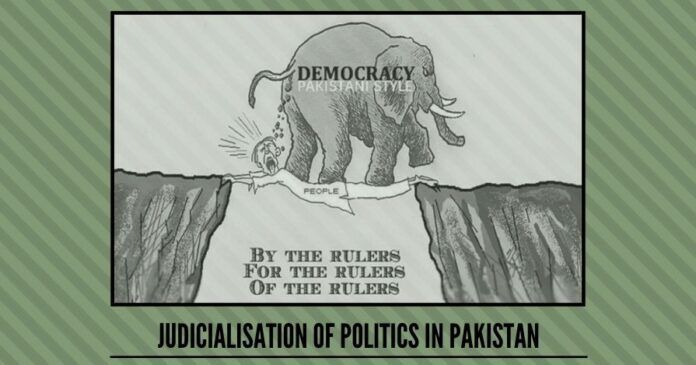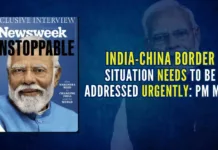
The unstable constitutionalism is directly enervating the foreign policy and international relations of the nation and the democracy as a social ethic has lost its credibility.
The basic elements of contemporary democracy and ethical constitutionalism demand the separation of the legislature, executive, and judiciary so that the three pillars of the state abide by their own constitutional parameters. With the growth of Pakistan as an unstable democracy both in terms of electoral politics and judicial development, there has been an excessive reliance on courts due to the expansion of rules and procedures of state’s treacherous polity. The universal role of the court is primarily to uphold and improve rule of law vis-à-vis making of a sound public policy. The judicialization of politics in a young democracy like Pakistan has been the biggest failure in terms of rule of law and constitutionalism. With a high amount of financial support being dumped in the region by China, the critical threat to a sound economic policy to utilize these resources is not neighboring states, but the internal political disturbances backed by the Constitution of the state itself. No amount of trade and monetary policy can bring about sustainability and progress in a region where the basic tenets of democracy are not protected.
While circus of military coups is out of trend these days, reduction of the country’s popular political culture is arbitrated by courts with the support of mainstream media.
The adjudication of political contests in Pakistan started from the 1950s and the historical record of legal decisions is explicitly cambered and titled against the elected representatives of the people. The gruesome history of judicialization of politics began as early as 1953 when the government of an elected Prime Minister, Khawaja Nazimuddin, was dismissed by the Governor General Ghulam Mohammad. Subsequently, the assembly was dismissed in 1954, when it diminished and restricted the constitutional authorities and powers of the Governor General. This administrative scenario and the executive route followed was condoned and disregarded by the federal judiciary led by Justice Muhammed Munir in the landmark case of Federation of Pakistan v. Maulvi Tamizuddin Khan. The federal court observed that “the Constitutional Assembly lived in a fool’s paradise if ever seized with the notion that it was the sovereign body of the state”. Additionally, this is when the controversial doctrine of necessity emerged as a useful instrument to justify extra-constitutional decisions. Justice Muhammed Munir applied Bracton’s maxim “that which is not otherwise lawful is made lawful by necessity”, and the Roman maxim endorsed by utilitarianism advocated by Jennings which said that “the well-being of the people is the supreme law”. The elephant in the room was addressed to justify subsequent coups in the country by the courts and the evil spirit of the doctrine of necessity has breached the judicially manageable standards. By the end of the 1970s, Pakistan’s popularly accepted Prime Minister Zulfiqar Ali Bhutto was convicted of murder “on the bare confession of an approver, kept in solitary confinement and executed in a prison yard”. After several years, one of the judges of the Supreme Court confessed on national television that he and his colleague judges were under immense pressure to declare Bhutto guilty. History repeated when his political heir, Benazir Bhutto, was incarcerated and exiled from the nation and when she did return to Pakistan and got elected, she was thrown out from office twice in the 1990s. The National Accountability Bureau (NAB) Court had shreds of evidence to prove that then Prime Minister Sharif and his business family laundered money in the 1990s to pay for four luxury apartments in Avenfield House in Park Lane, Central London. These charges followed the Panama papers leaks and charges framed by subsequent investigations conducted by authorities and other so-called independent agencies. He was also dismissed twice in 1993 and 1999. The latter was through a coup, which was also sanctioned by the Supreme Court. In July 2017, while in his third term, the Supreme Court of Pakistan disqualified him from holding public office. While circus of military coups is out of trend these days due to the rise of powerful intergovernmental and international bodies, reduction of the country’s popular political culture is arbitrated by courts with the support of mainstream media.
The legislature of Pakistan should propound legitimacy to the judicial structure, paradoxically, is dependent and surviving at the discretion of whims of judges.
The Lawyers Movement in 2007 to 2010, was able to get rid of military dictator Gen Musharraf and restore parliamentary sovereignty and democracy, but when it touched the institution itself, there were no meaningful and considerable changes. Pakistani Courts are tied and overburdened by cases and antiquated judicial procedures introduced by the British Raj and the total backlog of cases was around 2 million. The modern politically motivated judicial activism is clearly at the expense of parliamentary sovereignty and will of the people. The unorganized election management in democracies have opened floodgates to anti-establishment activities like impeachment, disqualification, electoral financing and delimitation, and the courts adjudicate on these issues with an unconstructive judicial mind and biased ideological orientation. The legislature of Pakistan according to the constitutional mandate should propound legitimacy to the judicial structure, paradoxically, is dependent and surviving at the discretion of whims of judges. The courts of Pakistan have revolutionized itself as an undemocratic institution masquerading as a stakeholder, to keep the country’s policymakers and policy influencers under judicial pressure. Many Pakistani legal experts and jurists have publicly proclaimed that the judiciary has become an extension of the military’s constitutional arm and is a politically motivated tool to weaken lawmakers. This kind of unstable constitutionalism is directly enervating the foreign policy and international relations of the nation and the democracy as a social ethic has lost its credibility.
Note:
1. The views expressed here are those of the author and do not necessarily represent or reflect the views of PGurus.
- Impact of India’s 2019 Interim Budget on Fourth Industrial Revolution Technologies - April 11, 2019
- HOW THE EUROPEAN UNION IS RETALIATING TO HUMAN RIGHTS VIOLATIONS IN CAMBODIA AND MYNAMAR - November 9, 2018
- Judicialisation of politics in Pakistan: A By-product of unstable constitutionalism - October 29, 2018











Basic ‘tenants’ of democracy? Or basic tenets of democracy? See excerpt in brackets (No amount of trade and monetary policy can bring about sustainability and progress in a region where the basic tenants of democracy are not protected.)
Hope it is a typo…
Good catch. Yes, it is a typo.
Journalists are talking about investment of Chinese in neighboring countries? What about India? Imports are increasing sky high in the recent years and it is going to be dangerous at a particular point of time. We are importing consumer goods and no investment for future return also. Government should think about this and also the public. People should desist from buying crackers, dolls, cell phones, laptops etc, which are made in China. Even if it is going to be costlier a bit, they should go for Indian made goods. Manufacturers in India should match their price with that of China and release quality goods.